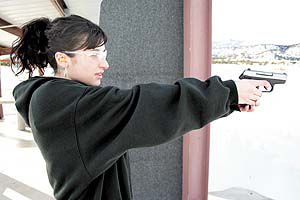| CEU student Erin Barker takes some target practice at the North Spings Shooting and Recreation Area. |
According to retailers in the Carbon County area, approximately 12 to 22 guns are sold during any given week. The numbers could be higher if retailers could keep up with local demand.
“Right now, we are only selling two to three guns per week,” said a representative from Charlie’s Pawn on Main Street in Price. “But that is only because we can’t keep guns in the shop. The demand is just too high.”
Tina Cook of A-1 Pawn and Loan also reported high local demand when asked about gun sales at the Price retailer.
“We sell anywhere from 10 to 15 guns a week,” said Cook. “And the week before Christmas our gun sales nearly reached 40.”
According to Cook, A-1’s sales are split 50/50 between handguns and rifles, with the reasons for purchase ranging from hunting to target practice to personal protection.
“For our handgun models, I would say that nearly 85 percent of customers report purchasing the gun for personal protection,” said Cook. “The rifles we sell go mostly to hunters.”
Cook detailed the significant amount of information and background checks that must be reported before any person can buy a weapon.
Federal law generally requires that licensed firearms dealers conduct a background check on all prospective firearms purchasers to ensure that such persons are not prohibited from buying or possessing a firearm.
The federal requirement and the National Instant Criminal Background Check System were enacted by the United States Congress through the Brady Handgun Violence Prevention Act.
Federal law defines several classes of prohibited purchasers, including:
•Convicted felons.
•Fugitives from justice.
•Persons adjudicated as mental defectives.
•Patients committed to mental institutions.
Federal law empowers the individual states with the authority to determine additional classes that may be prohibited from purchasing handguns.
More specific laws regarding handgun purchases may be found at the Gun Violence Prevention Center of Utah.
The website’s mission statement defines the center’s purpose as educating Utahns about the merits of moderate gun-violence prevention measures.
The measures include universal background checks, bans on the sale of military-style assault rifles and limitations on the places where concealed weapons can be carried.
According to the site, the center carries out various activities to accomplish the public education objective.
The gun violence prevention center’s activiinclude submitting newspaper and magazine articles, making public speaking appearances and consulting with lawmakers and community leaders about policy issues directed toward reducing gun violence.
Cook of A-1 reported that locally the BCI background check takes approximately 15-20 minutes after all pertinent information has been taken from the prospective buyer.
“Everyone must undergo the checks,” said Cook. “Even law enforcement officers, and after a purchase is made all information is reported directly to all law enforcement agencies in the area.”
Cook reported that the one exception to the checks is sales on black powder rifles.
“If you are turned down for a firearms purchase, a research number will be issued and individuals can then contact BCI to find out why they were denied,” said Cook. “We don’t receive that information here. We just know you were denied.
“Similarly, an approval number must be issued by BCI before we can make a sale,” added Cook.
In addition to passing a background check all potential buyers must be at least 21 years of age and a citizen of the state of Utah.
In Utah, members of the National Rifle Association may access gun information at fnra.freeutah.org.
The website claims to be dedicated to promoting safety, education and conservation activities by making grants to qualifying organizations.

